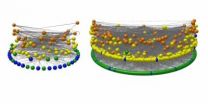US women unfamiliar with most stroke warning signs
American Heart Association Meeting Report
2014-03-19
(Press-News.org) Many U.S. women don't know most of the warning signs of a stroke, according to research presented at the American Heart Association's Epidemiology and Prevention/Nutrition, Physical Activity and Metabolism 2014 Scientific Sessions.
The study is also published in the American Heart Association journal, Stroke.
In a phone survey of 1,205 U.S. women:
More than half (51 percent) of the women identified sudden weakness or numbness on one side of the face, arms or legs as a warning sign of a stroke.
Less than half (44 percent) identified difficulty speaking or garbled speech as a warning sign.
Less than a fourth identified other signs of a stroke, including:
sudden severe headache (23 percent);
unexplained dizziness (20 percent); and
sudden vision loss (18 percent).
Hispanic women were less likely than others to know most of the warning signs of a stroke – 25 percent did not know any, compared to 18 percent for whites and 19 percent for blacks. .
Despite not knowing the warning signs, 84 percent of the women knew the importance of calling 9-1-1 if they thought they were having a stroke.
"This lack of recognition of stroke signs and symptoms could be a significant barrier to reducing death and disability related to stroke in the United States," said Lori Mosca, M.D., M.P.H., Ph.D., principal investigator of the study. "This is critically important because delays in getting care costs lives and hinders functional recovery."
Stroke affects more women than men, is the fourth-leading overall cause of death in the United States — the third leading cause of death for women — and is a primary cause of long-term disability among survivors. The risk is greatest among minority racial groups, including blacks and Hispanics.
The American Heart Association/American Stroke Association conducted the survey in 2012 as part of a study of heart and stroke awareness among women. Respondents were English-speaking women in the United States, 25 years or older at the time of the study. More than half were white, 17 percent were black, 17 percent were Hispanic and 12 percent were other races/ethnicities.
The association's national campaign to increase stroke awareness urges people to spot and respond to stroke with the acronym F.A.S.T.
Face drooping.
Arm weakness.
Speech difficulty.
Time to call 9-1-1.
"It's so important to recognize a stroke and get quick treatment," said Mosca, a professor of medicine and director of Preventive Cardiology at New York-Presbyterian Hospital/Columbia University Medical Center in New York. "Public awareness campaigns such as F.A.S.T., along with education from healthcare providers, can help raise that awareness."
INFORMATION:
Co-authors are Heidi Mochari-Greenberger, Ph.D., M.P.H., R.D., and Amytis Towfighi, M.D. Author disclosures are on the manuscript.
The study was funded in part by a National Institutes of Health career award to Dr. Mosca.
For the latest news from the meeting, follow us on Twitter: @HeartNews #EPINPAM14.
Statements and conclusions of study authors that are presented at American Heart Association scientific meetings are solely those of the study authors and do not necessarily reflect association policy or position. The association makes no representation or warranty as to their accuracy or reliability. The association receives funding primarily from individuals; foundations and corporations (including pharmaceutical, device manufacturers and other companies) also make donations and fund specific association programs and events. The association has strict policies to prevent these relationships from influencing the science content. Revenues from pharmaceutical and device corporations are available at http://www.heart.org/corporatefunding.
ELSE PRESS RELEASES FROM THIS DATE:
Researchers identify impaired new learning in persons with Parkinson's disease
2014-03-19
West Orange, NJ. March 20, 2014. Kessler Foundation scientists collaborated with colleagues in Spain to study memory and learning in patients with Parkinson Disease (PD). They found that the Parkinson group's ability to learn new information was significantly poorer when compared with the control group. The article was published ahead of print on February 24: Chiaravalloti ND, Ibarretxe-Bilbao N, Deluca J, Rusu O, Pena J, García-Gorostiaga I, Ojeda N. The source of the memory impairment in Parkinson's disease: Acquisition versus retrieval. Movement Disorders 2014 Feb 24. ...
Analysis: Industry-sponsored academic inventions spur increased innovation
2014-03-19
Industry-sponsored, academic research leads to innovative patents and licenses, says a new analysis led by Brian Wright, University of California, Berkeley professor of agricultural and resource economics.
The finding calls into question assumptions that corporate support skews science toward inventions that are less accessible and less useful to others than those funded by the government or non-profit organizations.
The analysis, based on a study of two decades of records from the University of California system, is in today's science journal Nature.
The National ...
NASA's Van Allen Probes reveal zebra stripes in space
2014-03-19
Scientists have discovered a new, persistent structure in one of two radiation belts surrounding Earth. NASA's twin Van Allen Probes spacecraft have shown that high-energy electrons in the inner radiation belt display a persistent pattern that resembles slanted zebra stripes. Surprisingly, this structure is produced by the slow rotation of Earth, previously considered incapable of affecting the motion of radiation belt particles, which have velocities approaching the speed of light.
Scientists had previously believed that increased solar wind activity was the primary ...
Sometimes less is more for hungry dogs
2014-03-19
Hungry dogs would be expected to choose alternatives leading to more food rather than less food. But just as with humans and monkeys, they sometimes show a "less is more" effect. Thus conclude Kristina Pattison and Thomas Zentall of the University of Kentucky in the US, who tested the principle by feeding baby carrots and string cheese to ten dogs of various breeds. The findings are published in Springer's journal Animal Cognition.
The research was conducted on dogs that would willingly eat cheese and baby carrots when offered, but showed a preference for the cheese. ...
Alzheimer's prevention trial to monitor reactions to higher disease risk status
2014-03-19
PHILADELPHIA - A new clinical trial will soon begin testing whether early medical intervention in people at risk for Alzheimer's can slow down progression of disease pathology before symptoms emerge, as outlined in Science Translational Medicine. For the first time, people with no Alzheimer's disease symptoms will be told of their risk status before being asked to join the randomized controlled trial. As part of the overall prevention trial, Penn Medicine neurodegenerative ethics experts will monitor how learning about their risk of developing Alzheimer's impacts trial ...
NJIT physicist helps to discover a new structure in Earth's radiation belt
2014-03-19
An NJIT physicist is a collaborator in the discovery of a new structure in Earth's inner radiation belt -- a zebra-striped structure of highly energized electrons that could endanger humans in space and also damage low-earth navigation and communication satellites.
And surprisingly, the new structure is produced not by solar activity but by Earth's slow rotation. Scientists had previously thought Earth's rotation couldn't affect the motion of radiation belt particles. The data supporting these discoveries comes from a measuring device aboard the two NASA Van Allen Probes ...
Scientists describe gut bacteria that cause sepsis in preterm infants
2014-03-19
Researchers studying intestinal bacteria in newborns have characterized the gut bacteria of premature infants who go on to develop sepsis, a serious and potentially life-threatening condition caused by bacteria in the bloodstream. Their findings suggest new strategies for the early detection and prevention of severe bloodstream infections. The research was funded by several components of the National Institutes of Health (NIH)—the Eunice Kennedy Shriver National Institute of Child Health and Human Development (NICHD), the National Human Genome Research Institute (NHGRI), ...
Ancient food webs developed modern structure soon after mass extinction
2014-03-19
Researchers from the Santa Fe Institute and the Smithsonian Institution have pieced together a highly detailed picture of feeding relationships among 700 mammal, bird, reptile, fish, insect, and plant species from a 48 million year old lake and forest ecosystem.
Their analysis of fossilized remains from the Messel deposit near Frankfurt, Germany, provides the most compelling evidence to date that ancient food webs were organized much like modern food webs. Their paper describing the research appears online and open access this week in Proceedings of the Royal Society ...
NIH grantees sharpen understanding of antibodies that may cut risk of HIV infection
2014-03-19
What immune response should a vaccine elicit to prevent HIV infection? Two studies published online today bring scientists closer to answering this question by identifying previously unrecognized attributes of antibodies that appear to have reduced the risk of HIV infection in the only clinical trial to show efficacy, albeit modest, of an experimental vaccine regimen in people.
Earlier analyses of the results of that trial, known as RV144, suggested that antibodies to sites within a part of the HIV envelope called V1V2 correlated with reduced risk of HIV infection. These ...
Patients enjoy good quality of life 10 years after esophagectomy and gastric pull-up
2014-03-19
Beverly, MA, March 19, 2014 – Long-term survivors after esophagectomy with gastric pull-up can enjoy a satisfying meal and good quality of life according to a new study from a team of researchers at the University of Southern California Keck School of Medicine, Los Angeles. This study concluded that pessimism about the long-term quality of life after an esophagectomy on the part of treating physicians and patients is unwarranted. It is published in the Journal of Thoracic and Cardiovascular Surgery, an official publication of the American Association for Thoracic Surgery. ...
LAST 30 PRESS RELEASES:
How periodontitis-linked bacteria accelerate osteoporosis-like bone loss through the gut
Understanding how cells take up and use isolated ‘powerhouses’ to restore energy function
Ten-point plan to deliver climate education unveiled by experts
Team led by UC San Diego researchers selected for prestigious global cancer prize
Study: Reported crop yield gains from breeding may be overstated
Stem cells from human baby teeth show promise for treating cerebral palsy
Chimps’ love for crystals could help us understand our own ancestors’ fascination with these stones
Vaginal estrogen therapy not linked to cancer recurrence in survivors of endometrial cancer
How estrogen helps protect women from high blood pressure
Breaking the efficiency barrier: Researchers propose multi-stage solar system to harness the full spectrum
A new name, a new beginning: Building a green energy future together
From algorithms to atoms: How artificial intelligence is accelerating the discovery of next-generation energy materials
Loneliness linked to fear of embarrassment: teen research
New MOH–NUS Fellowship launched to strengthen everyday ethics in Singapore’s healthcare sector
Sungkyunkwan University researchers develop next-generation transparent electrode without rare metal indium
What's going on inside quantum computers?: New method simplifies process tomography
This ancient plant-eater had a twisted jaw and sideways-facing teeth
Jackdaw chicks listen to adults to learn about predators
Toxic algal bloom has taken a heavy toll on mental health
Beyond silicon: SKKU team presents Indium Selenide roadmap for ultra-low-power AI and quantum computing
Sugar comforts newborn babies during painful procedures
Pollen exposure linked to poorer exam results taken at the end of secondary school
7 hours 18 mins may be optimal sleep length for avoiding type 2 diabetes precursor
Around 6 deaths a year linked to clubbing in the UK
Children’s development set back years by Covid lockdowns, study reveals
Four decades of data give unique insight into the Sun’s inner life
Urban trees can absorb more CO₂ than cars emit during summer
Fund for Science and Technology awards $15 million to Scripps Oceanography
New NIH grant advances Lupus protein research
New farm-scale biochar system could cut agricultural emissions by 75 percent while removing carbon from the atmosphere
[Press-News.org] US women unfamiliar with most stroke warning signsAmerican Heart Association Meeting Report


